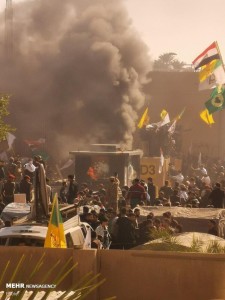
- Credit: Mehr News Agency
We have lots of ideas, but we need more resources to be even more effective. Please donate today to help get the message out and to help defend Israel.
 Elder of Ziyon
Elder of Ziyon
 09/22 Links Pt2: Dershowitz: Alumni, Donors Should Divest From Universities That Boycott IsraelFrom Ian:
Dershowitz: Alumni, Donors Should Divest From Universities That Boycott Israel
Attempts by universities to divest from Israel “should be met with a similar counter response from alumni and donors,” internationally … Read More
09/22 Links Pt2: Dershowitz: Alumni, Donors Should Divest From Universities That Boycott IsraelFrom Ian:
Dershowitz: Alumni, Donors Should Divest From Universities That Boycott Israel
Attempts by universities to divest from Israel “should be met with a similar counter response from alumni and donors,” internationally … Read More A war between peoples (Vic Rosenthal)
Vic Rosenthal's Weekly Column
There were eight stabbing attacks by Arabs against Jews in the last four days (as of Tuesday).
News item:
Speaking to students of Palestinian origin in Venezuela, Abbas… Read More
A war between peoples (Vic Rosenthal)
Vic Rosenthal's Weekly Column
There were eight stabbing attacks by Arabs against Jews in the last four days (as of Tuesday).
News item:
Speaking to students of Palestinian origin in Venezuela, Abbas… Read More Bibi's speech at the UN (text and video)
Following is a transcript of Prime Minister Benjamin Netanyahu's remarks today (Thursday, 22 September 2016), at the United Nations General Assembly in New York:
"Mr. President,
Ladies and Gentlemen,
What I'm about… Read More
Bibi's speech at the UN (text and video)
Following is a transcript of Prime Minister Benjamin Netanyahu's remarks today (Thursday, 22 September 2016), at the United Nations General Assembly in New York:
"Mr. President,
Ladies and Gentlemen,
What I'm about… Read More Abbas now claims that Israel has been illegally occupying land since 1948!
I'm reading the (Arabic) statement that Mahmoud Abbas gave to the UN, and it is filled with the usual lies.
But he added a new one, which is breathtaking in its chutzpah.
Abbas claims that Israel violated the UNGA resolu… Read More
Abbas now claims that Israel has been illegally occupying land since 1948!
I'm reading the (Arabic) statement that Mahmoud Abbas gave to the UN, and it is filled with the usual lies.
But he added a new one, which is breathtaking in its chutzpah.
Abbas claims that Israel violated the UNGA resolu… Read More 09/22 Links Pt1: Do Palestinians Deserve A State?; Mr. President: The Israeli settlements are legalFrom Ian:
IsraellyCool: Do Palestinians Deserve A State?
If you believe they deserve a state what qualities worthy of a reward do you believe they’ve shown over the last 100 years of attacking Jews and trying to prevent Jews… Read More
09/22 Links Pt1: Do Palestinians Deserve A State?; Mr. President: The Israeli settlements are legalFrom Ian:
IsraellyCool: Do Palestinians Deserve A State?
If you believe they deserve a state what qualities worthy of a reward do you believe they’ve shown over the last 100 years of attacking Jews and trying to prevent Jews… Read More
October 7, will go into history as the *Day of Revelation, where the armies of Jew hating Barbarians lost their shame & found their voice, sharing it...
Elder Of Ziyon - Israel News: BDS-supporting philosophy professor outed as a prominent neo-Nazi writer · 11 minutes ago
Goal: When you brainwash your children, you groom your next leaders. "The Jews plotted to crucify Jesus the Jew"? Like US students...
Elder Of Ziyon - Israel News: Indiana elementary school exhibit said “The Children of Israel has always been a difficult nation” · 29 minutes ago
Problem with the BBC is that they refuse to change. With their insufferable arrogance & holier than though attitude, they keep publishing lies & BS...
Elder Of Ziyon - Israel News: "BBC Verify" doesn't verify anything that exonerates Israel · 40 minutes ago
Hamas hiding in hospitals again, & beating medical staff who don't allow them to do so
03/20 Links Pt2: The Chilling Truth of 7 October; Eli Sharabi: Hamas eats like kings while hostages starve’; Columbia Did This To Itself ~ Elder Of Ziyon - Israel News · 5 hours ago
This video has a very happy ending----------Watch
https://youtu.be/CXfHMByMTJ4
03/20 Links Pt2: The Chilling Truth of 7 October; Eli Sharabi: Hamas eats like kings while hostages starve’; Columbia Did This To Itself ~ Elder Of Ziyon - Israel News · 5 hours ago
Netanyahu's Nowruz greetings to Persians
03/20 Links Pt2: The Chilling Truth of 7 October; Eli Sharabi: Hamas eats like kings while hostages starve’; Columbia Did This To Itself ~ Elder Of Ziyon - Israel News · 5 hours ago
It's a sentiment that's been spread for decades through songs, poems, plays, etc with the help of Palestinian media. See these two links for...
03/20 Links Pt2: The Chilling Truth of 7 October; Eli Sharabi: Hamas eats like kings while hostages starve’; Columbia Did This To Itself ~ Elder Of Ziyon - Israel News · 5 hours ago
LOL awesome
https://x.com/HilzFuld/status/1902669172582060478
03/20 Links Pt2: The Chilling Truth of 7 October; Eli Sharabi: Hamas eats like kings while hostages starve’; Columbia Did This To Itself ~ Elder Of Ziyon - Israel News · 5 hours ago
Cannot deny he has no pets!
03/19 Links Pt1: Arab plan for Gaza ignores Palestinians’ failed quest to destroy Israel; Hamas calls for global siege on US, Israeli embassies, Iran reveals ~ Elder Of Ziyon - Israel News · 5 hours ago
When you see a hostage praising terrorists, remember this
03/20 Links Pt2: The Chilling Truth of 7 October; Eli Sharabi: Hamas eats like kings while hostages starve’; Columbia Did This To Itself ~ Elder Of Ziyon - Israel News · 5 hours ago
Omri: "Elder is one of the best established and most respected members of the jblogosphere..."
